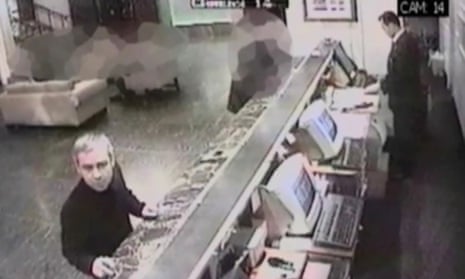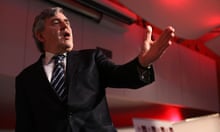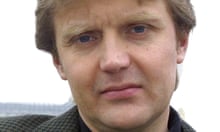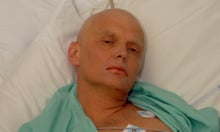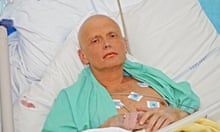Sir Robert Owen’s report into Alexander Litvinenko’s death runs to 338 pages. Written in clear prose, with the odd moment of dry wit, it is a damning indictment of the Russian president and his state, and of the two, sometimes hapless, poisoners - Dmitry Kovtun and Andrei Lugovoi - who followed its secret orders.
The investigation into Litvinenko’s murder was one of the most extensive in British criminal history. Scotland Yard’s evidence – revealed at last year’s public inquiry – included forensic reports, a “radiation schedule”, phone records and CCTV footage. There was also testimony from 62 witnesses, as well as a “considerable” amount, the report reveals, of secret intelligence material.
They key chapters in the public inquiry report cover exactly what happened on 1 November 2006 in the Millennium hotel in Mayfair, where Litvinenko ingested poison 22 agonising days before he died in a London hospital bed. All parties agree that Litvinenko met Lugovoi and Kovtun in the Pine Bar where he took a few sips of green tea. The two Russians have denied any involvement with Litvinenko’s murder, but, as Owen notes, refused to appear by video to give evidence.

Owen is “sure”, he concludes, that the pair did indeed kill Litvinenko, not through “personal animus” but “on behalf of others”. The men left an extensive polonium trail – in hotel rooms, on plane seats, at restaurant tables, and even on a shisha pipe smoked by Lugovoi on a Soho terrace. The pair knew they were carrying poison, the report says, but didn’t know “what precisely the chemical they were handling was, or the nature of all of its properties”.
Lugovoi, in fact, had encouraged his eight-year-old son, with whom he was travelling, to shake Litvinenko’s hand after he had drunk the polonium, and the fact that it was “splashed around in hotel bedrooms”, notes the report, suggests the men had no idea what they were dealing with.
Owen makes clear it was the scientific evidence that persuaded him the two Russians were guilty. Lugovoi travelled three times to London in October and November 2006, and Kovtun twice, and the inquiry was told that they had first tried to poison Litvinenko on 16 October 2006, when they met him in the boardroom of a Mayfair security firm.
Polonium radiation was found in the three hotel bedrooms where they stayed in London, and scientists found extremely high levels of radiation in the bathroom plughole of room 382 of the Millennium hotel – Kovtun’s room – and in room 107 of the Best Western hotel, where they also stayed.
“The natural inference is that Po 210 had been poured down the sink. Since this appears to have happened in both rooms it is logical to assume that it was part of a routine,” Owen writes.
Polonium was also found in a third hotel, the Sheraton, where Lugovoi stayed on his own. The evidence was consistent with Lugovoi “having spilled the polonium in the course of handling it”, then “mopping it up with towels that were subsequently found in the laundry”.
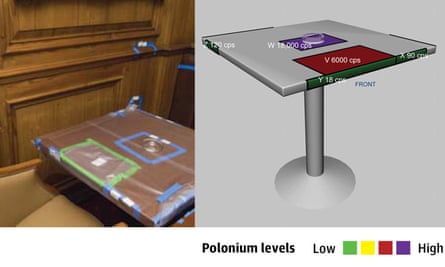
In newspaper interviews both men have claimed they were victims of a set-up. But the report says there are “serious deficiencies” in these claims and adds that in several instances Lugovoi was lying. Owen points to a key phone call made by Kovtun, a former waiter in Germany, on the morning of 1 November to a witness known as C2, a cook and Kovtun’s former colleague.
Kovtun had previously told another colleague, known as D3, that he was looking for a cook to put “a very expensive poison” in Litvinenko’s food or drink. At 11.33am on 1 November, Kovtun unsuccessfully tried to contact C2 in London, but he was unable to help, he told the inquiry. Eight minutes later, Lugovoi called Litvinenko and invited him to a meeting that afternoon at the Millennium hotel.
The report describes the phone calls as “highly suggestive”. It adds: “Once it had become apparent to Mr Lugovoi and Mr Kovtun that they would not get any help from C2, at least not in the short term, they decided to make another attempt to poison Mr Litvinenko themselves. Their plan, which they subsequently put into effect, was to make the attempt in the Pine Bar of the Millennium hotel.”
Lugovoi and Litvinenko had first met in the 1990s when they were both members of the oligarch Boris Berezovsky’s entourage. In 2004 Lugovoi called Litvinenko from Moscow and suggested they go into business. “I regard it as entirely possible that Mr Lugovoi was already at that stage involved in a plan to target Mr Litvinenko, perhaps with a view to killing him,” Owen writes.
Owen’s conclusion that Putin and his spy chief, Nikolai Patrushev, “probably approved” Litvinenko’s murder appears to be largely driven by secret evidence heard in closed sessions, some of which he hints at in the report.
He says he held “closed hearings” over several days last May, which took place “in a government building in London”. The only people there were the judge, the home secretary’s legal team, and the counsel and solicitor to the inquiry. Several nameless witnesses gave evidence. “There is a considerable quantity of closed documentary evidence in this case. I have also received a number of closed witness statements, some of which are lengthy.” The witnesses, one can assume, were from MI6 and possibly other intelligence departments.
Why was Litvinenko killed?
Lugovoi and Kovtun may not have had a personal reason for the murder, but there were plenty of others within the Russian state machine who did, according to the report.
Within Russia’s Federal Security Service (FSB), Litvinenko was regarded as a traitor for accusing the agency both of colluding with the mafia and of being behind the apartment bombings in four Russian cities in 1999 that helped precipitate the Chechen war.
Russian secret services were also aware that Litvinenko had begun working for their British equivalent, MI6, and his associations with Berezovsky and the exiled Chechen leader, Akhmed Zakayev, both outspoken Kremlin critics, was equally unwelcome.
But there was also, the inquiry found, “undoubtedly a personal dimension to the antagonism” between Litvinenko and Putin. The bad blood went back to 1998, when the then FSB officer met the newly appointed director of the agency to protest about corruption, with little effect. It only intensified in the following years, culminating in July 2006 when Litvinenko wrote an article claiming Putin was a known paedophile who had used his power as FSB chief to destroy videotapes of himself having sex with underage boys.
Just days before his death, Owen notes, Litvinenko was pointedly accusing Putin, by then the Russian president, of being responsible for murdering the journalist Anna Politkovskaya, who was shot dead in Moscow in early October 2006. “I am satisfied,” notes Owen, “that in general terms, members of the Putin administration, including the president himself and the FSB, had motives for taking action against Mr Litvinenko, including killing him, in late 2006.”
The judge was less convinced, however, by one key theory about the murder: that it was ordered in response to a highly critical report, written by Litvinenko for a private security firm, about Russia’s then deputy prime minister, Victor Ivanov. The report accused Ivanov of having close links with criminal gangs in St Petersburg, notes the report, and asserts that Putin was complicit in his dealings with “gangsters”.
Despite assertions during and after the inquiry that the Ivanov report had triggered the killing, Owen says the evidence points to a murder plot being under way before that report was even drafted. It may, however, have provided “extra motivation and impetus to a plan that had already been conceived”.
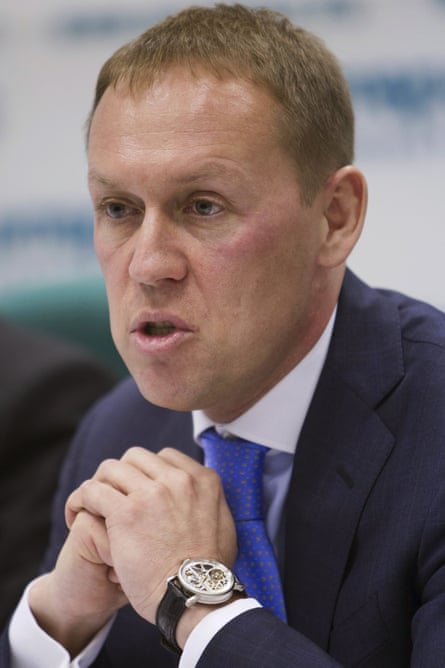
Similarly, suggestions that the two killers were acting on behalf of a Russian mafia group “would not be implausible”, says Owen, given Litvinenko was supplying information to both MI6 and the Spanish security services. “That theory, however, is not supported by the evidence that is available to me.”
Though he concedes it is not in itself proof of agency, Owen notes that in the years since 2006, “the Russian state in general, and President Putin in particular”, have bestowed particular favour on Lugovoi, including giving him a medal for “services to the fatherland” while the inquiry was happening last year. Clearly, he observes, “the Russian state approves of Mr Litvinenko’s killing, or at least ... wishes to signal approval for it”.
The inquiry, notes Owen, was highly unusual in one key regard. After ingesting the poison it took more than three weeks for Litvinenko to die. During his final days he gave detailed statements to police officers, stressing his belief that ultimate responsibility for his pending death lay at the very top of the Kremlin.
“It is, to put it mildly, unsual when inquiring into a death to have available lengthy transcripts of interviews with the deceased, conducted shortly before his death,” writes Owen in the report. Litvinenko’s evidence in his own murder investigation had been “of great value to this inquiry”, he said.
